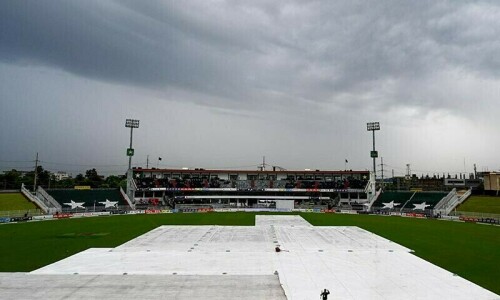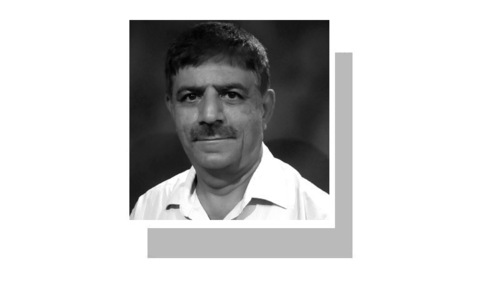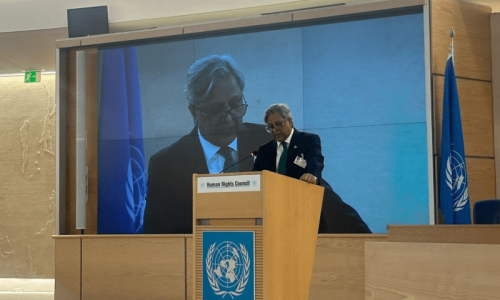The Foreign Office (FO) on Monday confirmed that Pakistan carried out “intelligence-based anti-terrorist operations” inside the border regions of Afghanistan, hours after Kabul said airstrikes conducted on its soil had killed eight people.
A press release from the FO said the prime targets of the operation conducted in the morning earlier today were terrorists belonging to the Hafiz Gul Bahadur Group, adding that the outfit, along with the banned militant Tehreek-i-Taliban Pakistan (TTP), was responsible for multiple terrorist attacks inside Pakistan, resulting in “deaths of hundreds of civilians and law enforcement officials”.
The FO added that the latest attack of such an instance took place on Saturday at a security post in Mir Ali in North Waziristan which claimed the lives of seven Pakistani soldiers.
The strikes come a day after President Asif Ali Zardari vowed retaliation following the martyrdom of the seven soldiers, including two officers, in the Saturday attack.
Offering the funeral prayers of the two officers, he had asserted that the blood of the martyrs would not go in vain and the country would avenge them. The president said Pakistan would not hesitate to strike back if attacked by anyone at borders or inside its territory.
The Hafiz Gul Bahadar group had claimed responsibility for the deadly attack in North Waziristan. Security officials say that fighters of the Gul Bahadar group operate from the Afghan side of the border, mostly from Khost.
The strikes come amid growing contact between Pakistan and the Afghan Taliban rulers in recent days.
Pakistan’s charge d’affaires in Kabul travelled to Kandahar last week to meet Mullah Shirin Akhund, the Taliban governor for southern Kandahar who is one of the close confidants of the Taliban chief.
‘Pakistan had repeatedly conveyed concerns to Afghan authorities’
The FO statement said that over the years, “Pakistan has repeatedly conveyed its serious concerns to the interim Afghan government over the presence of terror outfits, including TTP, inside Afghanistan. These terrorists pose a grave threat to Pakistan’s security and have consistently used Afghan territory to launch terror attacks inside Pakistani territory.”
The FO said Pakistan accorded “prime importance” to Afghanistan’s sovereignty and territorial integrity and therefore, always prioritised dialogue and cooperation to confront the terrorist threat.
“We have repeatedly urged the Afghan authorities to take concrete and effective action to ensure that the Afghan soil is not used as a staging ground for terrorism against Pakistan. We have also called on them to deny safe havens to TTP and to hand over its leadership to Pakistan.
“Pakistan has great respect for the people of Afghanistan. However, certain elements among those in power in Afghanistan are actively patronising TTP and using them as a proxy against Pakistan. Such an approach against a brotherly country, which stood with the people of Afghanistan through thick and thin, manifests shortsightedness. It ignores the support extended by Pakistan to the people of Afghanistan over the last several decades.
“We urge these elements in power to rethink the policy of siding with khwarij terrorists shedding the blood of innocent Pakistanis and to make a clear choice to stand with the people of Pakistan,” the FO said.
It concluded that terrorist groups such as the TTP were a collective threat to regional peace and security, adding that it fully realised the challenge Afghan authorities faced in combating the threat posed by TTP.
The FO said Pakistan would continue to work towards finding joint solutions in countering terrorism and to prevent any terrorist organisation from sabotaging bilateral relations with Afghanistan.
Afghanistan warns of dire consequences, summons Pakistani Cd’A
Zabihullah Mujahid, the spokesperson of the government, alleged earlier today in a statement that Pakistani aircraft had carried out airstrikes on Afghan soil in the provinces of Paktika and Khost along the Pakistan border, killing eight people.
The Paktika province is located near Pakistan’s South Waziristan District while Khost is situated near North Waziristan.
Mujahid said that at “around 3am, Pakistani aircraft bombarded civilian homes” in Khost and Paktika provinces, claiming that all eight people killed were women and children.
Mujahid told Dawn.com that planes had bombed the Laman area in Paktika’s Barmal district and the Afghan-Dubai area in Khost’s Spera district.
Alleging that “houses of common people were targeted”, he said three women and as many children were killed in Paktika and a house collapsed while two women were killed in Khost, where a house was destroyed as well.
In a government statement posted on Mujahid’s X account, he said: “The Pakistani side is saying that [militant] Abdullah Shah was targeted in the strikes but he lives on the Pakistani side. Members of the same tribe live on both sides and routinely move across the border.”
He stated: “The Islamic Emirate strongly condemns the attacks and describes these as non-serious actions and violation of Afghanistani territory.”
The spokesperson further said: “Pakistan should not blame Afghanistan for their problems and failure to control violent incidents. Such acts can lead to dire consequences which will not be in control of Pakistan.”
A statement posted later by the Afghan foreign ministry said it summoned Pakistan’s charge d’affaires and also sent him a letter of protest.
“Besides condemning the attacks, the Ministry of Foreign Affairs informs Pakistan that the Islamic Emirate of Afghanistan has a long experience of fighting for freedom against the superpowers of the world and cannot tolerate aggression on its territory in any way.
“The new civilian government and the people of Pakistan should not allow some circles to complicate the relations between the two neighbouring Muslim countries with their irresponsible actions and wrong policies,” the statement said.
The TTP also confirmed the strikes.
Meanwhile, the Afghan defence ministry said its forces “targeted bases of Pakistani security forces across the border in response to Pakistan air strikes”.
In a statement, it said: “In response to that aggression, the border forces of the Islamic Emirate of Afghanistan targeted military bases of Pakistan’s army across the artificial Durand Line with heavy weapons.”
“The country’s defence and security forces are ready to respond to any kind of aggression and will defend the country’s territorial integrity in any situation,” it asserted.
The statement, issued with a photo of Afghan Defence Minister Mullah Yaqoob, said Pakistani fighter jets and drones entered Afghanistan airspace and bombed “houses of civilians in an act of aggression”.
Afghan govt providing safe haven to terrorists: ISPR
The Inter-Services Public Relations (ISPR), in a statement, asserted that the “recent wave of terrorism in Pakistan has the full support and assistance of Afghanistan” but did not comment directly on the strikes.
“The Afghan interim government is not only arming the terrorists but also providing a safe haven for other terrorist organisations as well as being involved in the incidents of terrorism in Pakistan,” it stated.
“With the help of the Afghan Taliban and the supply of modern weapons, there has been an increase in the incidents of terrorism in Pakistan,” the ISPR added.
About the recent North Waziristan checkpost attack, the military’s media wing said the “fabric of loss of precious lives is also found with terrorists taking shelter in Afghanistan”.
The statement said there was “clear evidence of involvement of terrorists from Afghanistan” in the Zhob Garrison attack in July 2023. It added that “TTP terrorists armed with the latest American weapons attacked two army check posts in Chitral” in September last year.
The military’s media wing said that the November attack on Mianwali Air Base was “also planned by the terrorists taking refuge in Afghanistan”. It said that “terrorists from Afghanistan used night vision goggles and foreign weapons” in the Dera Ismail Khan attacks in December.
“There is clear evidence of the involvement of TTP terrorists who took refuge in Afghanistan in the terrorist incident in Tank on Dec 15, 2023,” the ISPR stated.
The statement also said terrorists from Afghanistan were also involved in the Peshawar Police Lines blast in January 2023, which claimed more than 80 lives.
Fatalities reported in Kurram cross-border clashes
Separately, a captain was reported to have been martyred and two soldiers were said to be injured in cross-border exchanges in Kurram District’s Parachinar today.
Kurram District Police Officer (DPO) Mazhar Jahan told Dawn.com about the casualties, adding that cross-border firing was ongoing.
He stated that the security forces were on “high alert” while local tribal leaders were also “cooperating” with the forces. “Emergency” status was imposed on all hospitals, the DPO added.
Turi Bangash tribe’s elder Jalal Bangash condemned the “baseless attack from Afghanistan”. He said such attacks on Pakistani territory should be refrained from in the future.
Malik Nazeer, a resident of the border area of Borki, told Dawn.com that people on both sides of the border have started evacuating the area.
8 terrorists, including high-value target, killed in IBO
Meanwhile, eight terrorists, including a high-value target (HVT), were killed in an intelligence-based operation in North Waziristan on the “night [of] March 17/18”, the ISPR said.
In a statement, the military’s media wing said, “During the conduct of [the] operation, after intense fire exchange, eight terrorists including HVT terrorist commander Sehra alias Janan, were sent to hell.”
The ISPR said Janan was “involved in orchestrating” the recent Saturday attack in North Waziristan and was “highly wanted by the law enforcement agencies”.
“Sanitisation operations are being conducted to eliminate any other terrorists found in the area as the security forces of Pakistan remain determined to wipe out the menace of terrorism from the country,” the statement asserted.
‘Avenged blood of martyrs’: ex-Balochistan minister
Jan Achakzai, the former caretaker Balochistan information minister, said, “Pakistan has avenged the blood of martyrs and targeted the safe havens of terrorists near the border.”
In a post on X, he said, “If there is any terror attack in Pakistan, we will conduct a strong attack inside Afghanistan. Remember, the life of a Pakistani is more valuable for us than the entire Afghanistan.”
Former caretaker foreign minister Jalil Abbas Jilani, while extending his prayers for the soldiers martyred in the North Waziristan attack, said the army was “fighting the evil forces of terror originating from Afghanistan”. “This cowardly terror attack will be avenged,” he said in a post on X.
Afghan journalist Bilal Sarwari said the strikes marked a “turbulent page” in Pak-Afghan relations.
“This marks a turbulent page in the relations between the new Pakistani government and the Afghan Taliban. Pakistan must now rue its investment and opportunities on the Taliban,” Sarwari, who fled Afghanistan after the Taliban took over in August 2021, said in a post on X.
TTP funding
Two days ago, Pakistan’s Special Representative on Afghanistan Ambassador Asif Durrani said Islamabad had evidence that the TTP was getting money from India through Afghan proxies, estimating that 5,000 to 6,000 TTP militants had taken shelter in Afghanistan.
“If we include their families, then the number goes up to 70,000,” Durrani said on Saturday while speaking at a programme hosted by an Islamabad-based think tank on the Afghan peace process.
In January last year, the FO categorically rejected reports claiming that Pakistan had carried out airstrikes in Afghanistan’s Nangarhar province.
Earlier this year, Iran had launched attacks in Pakistan targeting what it described as bases for the militant group Jaish al-Adl in the border town of Panjgur in Balochistan, leading to retaliatory strikes from Pakistan.
Ties between both countries saw a brief breakdown before they resolved to lower tensions and restored diplomatic ties.
Additional input from AFP














































